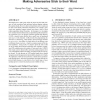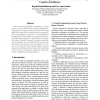73 search results - page 3 / 15 » Security of erasable memories against adaptive adversaries |
119
click to vote
CCS
2006
ACM
15 years 5 months ago
2006
ACM
We introduce a simple primitive called Augmented Broadcast Encryption (ABE) that is sufficient for constructing broadcast encryption, traitor-tracing, and trace-and-revoke systems...
164
click to vote
EUROCRYPT
2010
Springer
15 years 6 months ago
2010
Springer
Imagine many small devices send data to a single receiver, encrypted using the receiver’s public key. Assume an adversary that has the power to adaptively corrupt a subset of the...
137
click to vote
SOSP
2007
ACM
15 years 10 months ago
2007
ACM
Researchers have made great strides in improving the fault tolerance of both centralized and replicated systems against arbitrary (Byzantine) faults. However, there are hard limit...
125
click to vote
CNSR
2008
IEEE
15 years 8 months ago
2008
IEEE
Secure and energy efficient transmission is a main concern in many wireless sensor network applications. In this paper, two types of denial-of-service attacks that affect the rout...
118
click to vote
CTRSA
2009
Springer
15 years 8 months ago
2009
Springer
In the setting of multiparty computation a set of parties with private inputs wish to compute some joint function of their inputs, whilst preserving certain security properties (l...


